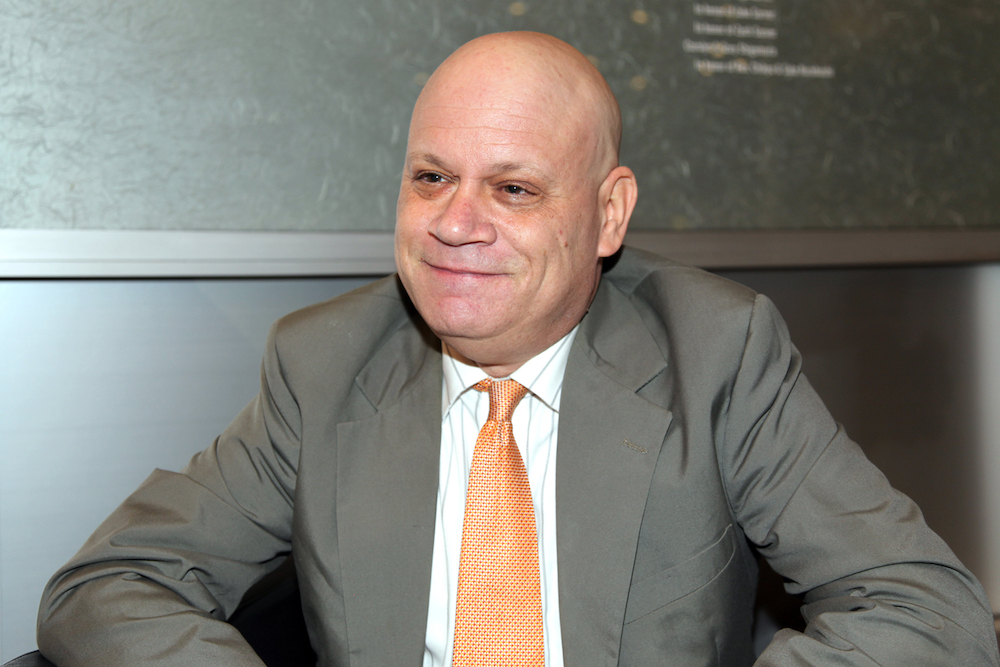
Photo by Aaron Salcido.
Jess Bravin covers the U.S. Supreme Court for The Wall Street Journal, and is the author of The Terror Courts, an award-winning account of military trials at Guantanamo Bay, and Squeaky: The Life and Times of Lynette Alice Fromme. Previously, he was a reporter for the Los Angeles Times, evaluated scripts for a Hollywood talent agency, managed a campaign for local school board, and earned a law degree at UC Berkeley. Before joining a Zócalo/UCLA Downtown event titled “How Will the New Supreme Court Change America?” he spoke in the green room about Raymond Chandler, Chief Justice Marshall’s famous collection of Spanish wine, and L.A.’s limitless horizons.
You led the effort to designate Raymond Chandler Square (Los Angeles City Historic-Cultural Monument No. 597) in Hollywood, in honor of the hard-boiled novelist. What is Raymond Chandler’s best book?
Farewell My Lovely, I think that’s clear.
What is the best movie based on a Raymond Chandler book?
The Big Sleep.
Who is your favorite lawyer from TV or the movies?
Sir Wilfrid Robarts, the character played by Charles Laughton in Witness for the Prosecution.
What Supreme Court Justice, living or dead, would you most want to have a drink with?
The answer I’ve heard other people give before is Chief Justice Marshall, because of his famous Madeira club, where he would bring in barrels of the great Spanish wine. As a result of some kind of conflict between Spain and England, the Spanish couldn’t sell their wine so he managed to get a good deal on it.
What book about the Supreme Court have you found most useful to your work?
I do think that The Brethren [by Bob Woodward and Scott Armstrong] was a bracing introduction to the court as a human institution that really hadn’t been laid out before or since. That would be the last book on the list of Supreme Court justices. They don’t care for that gossipy stuff, but it gives a perspective.
Which current member of the Court is most likely to engage in conversation with journalists?
I would say Justice Breyer. He once complained to me about the dwindling number of reporters in the press room at the Supreme Court. And I said, “It’s sort of out of my hands, sir. That’s something you might want to bring up to publishers and media executives.” He said, “Fine then, set it up.” I reported back to my bureau chief and he ended up speaking at what is now the American Society of News Editors, and I was the moderator.
Justice Breyer seeks to be accessible in that way—he sees it as part of his duty. And he’s written some books, which tends to loosen the lips of justices who want to bring attention to what they’ve written, and maybe move some product.
What’s the most important thing we should know about Squeaky Fromme?
The most important things I got out of writing that book was that this was a story about a cult from the perspective of a follower, as opposed to a leader. What struck me was how much of that experience was for her—it almost appeared to be her projections onto [Charles] Manson. Her idea of what that experience meant was so much different than what the rest of the world thought the Manson family to be about.
She also was and is—I spoke to her a few months ago—a complete person and brought to that experience in the Manson family a whole set of experiences that caused things to play out in a certain way. It’s easy to write her off because she’s a fanatic. The fact that she’s a fanatic doesn’t mean that there aren’t significant aspects of her character that are really illuminating.
What do you miss most about Berkeley, where you studied?
My rent-controlled apartment.
Which story of yours do you find yourself thinking about most often?
It’s probably the same one that was expanded significantly into a book, headlined, “The Conscience of a Colonel.” It was about a Marine lieutenant colonel and military prosecutor at Guantanamo who refused to bring charges against a high-value detainee after finding out he’d been tortured. It showed the crucible to which American values were put on an individual level after 9/11. There are a lot of stories now of people rationalizing or explaining or justifying why they took part in torture or authorized it, or why they thought they had lost their moorings after 9/11. This story [about the prosecutor] was about someone whose values—military values, religious values, legal values, American values—stayed the same at the core.
What do you miss about L.A.?
Mexican food. And at the most abstract level the limitless horizons that the city really embodies. Beyond that, it’s a place that gives so many different imaginations something to conjure with. And it’s a place that until recently could, in one form or another, find room for everyone.
If you weren’t a journalist, what would you be?
Dead? There aren’t that many occupations welcoming to misanthropes and to people who recoil at the concept of being a team player and all that. Anyone can reach me on Twitter if they’ve got ideas.



